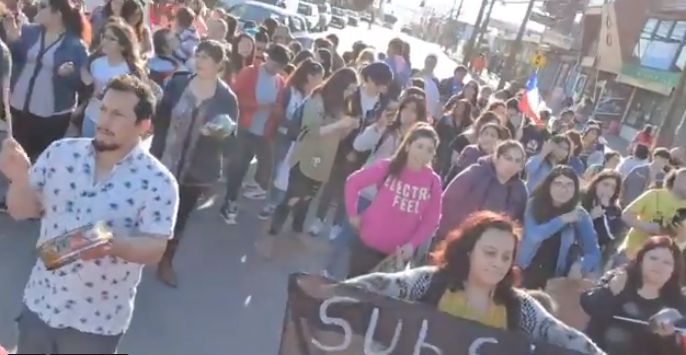Chilean President backtracking: Sebastian Pinera announced Saturday the suspension of the increase in prices of metro tickets in Santiago, causing particularly violent demonstrations in the capital where a total curfew was decreed.
“I want to announce today that we will suspend the increase of metro fares,” said the president since the presidential palace of La Moneda, shortly before the general appointed to ensure the security of the capital announces a total curfew in Santiago in response to “excesses that have occurred today”.
Clashes between protesters and police began again on Saturday, the day after the introduction of the “state of emergency” in Santiago, shaken by a protest against rising transport prices.
Three people died in the fire of a supermarket that was ransacked Saturday night in Santiago, the authorities said.
“Three people died in a fire in a supermarket. Two were burned and the third was transported to a serious condition in a hospital where she died, “Karla Rubilar, mayor of the city, told the press.
Chile is presently seeing its worst riots in decades. This is the ENEL building in Santiago.
Strike you as under-reported? That’s because Maduro isn’t the President. pic.twitter.com/Gsdv6C5Mdl
— Aaron Bastani (@AaronBastani) October 19, 2019
Thousands of people had gathered for a pot concert, a mode of protest that appeared after the coup led by General Augusto Pinochet at the end of 1973, but the demonstration quickly degenerated into clashes between masked people and special forces.
En el extemo sur de la isla de Chiloé #ChileDesperto #EstadoDeEmergencia #Quellón #Chile pic.twitter.com/3cW5EYwHsi
— N. Parra (@naparravasquez) October 19, 2019
In particular, clashes have been reported on the main square of Italy, the epicentre of the protest, and near the seat of government, as well as in Puente Alto, in the southern suburbs of the capital. AFP journalists have seen five bus burns in the city centre, and the authorities decided in the day to completely stop their traffic.
“Chile woke up”
Sebastian Pinera had decreed in the night of Friday to Saturday the “state of emergency” for 15 days in Santiago and entrusted to the general Javier Iturriaga del Campo the responsibility to assure the security. Soldiers thus patrolled Saturday in Santiago, for the first time since the return to democracy, in 1990.
Thousands of people, however, came down the streets of the capital and other cities to make pans resound. Demonstrations have also been held in major cities on the Pacific Rim such as Valparaiso. In this port, 120 km west of Santiago, dozens of protesters burned the headquarters of “El Mercurio”, the oldest newspaper in the country, according to television footage.
In Santiago, in front of the soldiers deployed on the Place d’Italie in Santiago, demonstrators carried pictures of persons who disappeared under the military dictatorship (1973-1990), which resulted in more than 3200 dead or missing.
“Fed up with abuse”
With slogans such as “Tired of abuse” or “Chile woke up”, broadcast on social networks, the country faces one of the worst social crises in decades. This was triggered by the mere announcement of an increase in the price of metro tickets, from 800 to 830 pesos (about 1.04 euros).
The claims then quickly spilled over onto other topics, such as an economic model where access to health and education is almost entirely private.
General Iturriaga del Campo said that the army would conduct patrols in the main sites of the capital, which has seven million inhabitants. Given the extent of the damage on Saturday, he has decreed a curfew total in the capital to take effect at 2200 hrs until 0700 hrs local time without specifying the number of days during which this measure apply to. State of emergency and curfew were then extended to the region of Valparaiso (centre) and to the province of Concepcion (south), announced local authorities.
A photo of President Sebastian Pinera quietly enjoying a pizza in a restaurant while Santiago burned increased the anger of the population, in a country where relative calm reigned in recent years. Visibly caught out by this crisis, Sebastian Pinera had described his country, just a few days ago, “oasis” in the region.
A country “pressure cooker”
“It’s sad, but this destruction was the way people found it to be listened to. Chile was a pressure cooker that exploded in the worst way, leaving us without a metro, “commented Maria Maria, a civil servant.
Friday, at least 16 buses were burned and a dozen subway stations totally destroyed, according to the authorities. “The entire network is closed due to riots and destruction,” said the subway manager, after attacks against almost all 164 stations.
The Santiago Metro, the largest (140 km) and most modern in South America, which carries about three million passengers a day, may only reopen gradually next week.
A special report prepared by our correspondent Abhijit Roy Chaudhary
